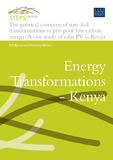The political economy of state-led transformations in pro-poor low carbon energy: A case study of solar PV in Kenya
| dc.contributor.author | Byrne, Rob | |
| dc.contributor.author | Mbeva, Kennedy | |
| dc.coverage.spatial | Kenya | en |
| dc.date.accessioned | 2017-05-04T09:37:54Z | |
| dc.date.available | 2017-05-04T09:37:54Z | |
| dc.date.issued | 2017-05-02 | |
| dc.identifier.citation | Byrne, R. and Mbeva, K. (2017) The Political Economy of State-led Transformations in Pro-poor Low Carbon Energy: A Case Study of Solar PV in Kenya, STEPS Working Paper 91, Brighton: STEPS Centre | en |
| dc.identifier.isbn | 978-1-78118-364-9 | |
| dc.identifier.uri | https://opendocs.ids.ac.uk/opendocs/handle/20.500.12413/12968 | |
| dc.description.abstract | International efforts to achieve goals such as universal energy access and climate change mitigation are expected to stimulate billions of dollars of private financial flows to developing countries for clean (energy) technology transfer investments. Policies for realising these ambitions are framed in terms of neoliberal development orthodoxy, but critical voices call for more active state intervention based on arguments showing that free markets alone will not deliver the needed technologies and other innovations with the urgency required. This sets up the potential for a confrontation of contradictory ideologies in the making and implementation of policy: neoliberal orthodoxy at the level of global agreements versus state-led developmentalism at the national level. What this will mean for action on the ground, as those who promote clean energy access technologies and innovations seek to realise their development goals, is an open question. This paper analyses the case of the solar photovoltaic (PV) market in Kenya as a way to explore this and other issues. The Kenyan PV market is considered one of the most successful off-grid markets in the developing world and is often hailed as an exemplar of neoliberal development orthodoxy. However, based on reinterpretation of existing STEPS research into the evolution of this market, which took a niche theory approach, we argue that the Kenyan PV niche and market would not have developed without the support and active intervention of donors, many of whom – paradoxically – espouse neoliberal policy prescriptions. Drawing from discursive institutionalism, we develop a political economy lens to reinterpret our existing research, and find that the Kenyan PV niche is now facing an uncertain future, even as the solar PV market may continue to flourish. At a more general level, we reflect on what the case tells us about future encounters between neoliberal orthodoxy and more developmentalist aspirations, encounters we might expect to increase in the process of realising the policy ambitions noted above. We argue that, if the Kenyan case acts as an example of a more general phenomenon, we need to understand policy making in its context, paying attention to historical socio-political relations across 'scales' of policy action, from the global to the local. The Kenyan case illustrates that action on the ground will likely be the outcome of messy negotiated interactions between competing and contradictory ideologies rather than determined simply by powerful global forces such as neoliberal hegemony. | en |
| dc.description.sponsorship | ESRC | en |
| dc.description.sponsorship | CDKN | en |
| dc.language.iso | en | en |
| dc.publisher | ESRC STEPS Centre | en |
| dc.relation.ispartofseries | STEPS Working Papers;91 | |
| dc.rights | Users are welcome to copy, distribute, display, translate or perform this work without written permission subject to the conditions set out in the Creative Commons licence. For any reuse or distribution, you must make clear to others the licence terms of this work. If you use the work, we ask that you reference the STEPS Centre website (www.steps-centre.org) and send a copy of the work or a link to its use online to the following address for our archive: STEPS Centre, University of Sussex, Library Road, Brighton BN1 9RE, UK (steps-centre@ids.ac.uk). | en |
| dc.rights.uri | http://creativecommons.org/licenses/by-nc-nd/3.0/ | en |
| dc.subject | Climate Change | en |
| dc.subject | Environment | en |
| dc.subject | Industrial Development | en |
| dc.subject | Technology | en |
| dc.title | The political economy of state-led transformations in pro-poor low carbon energy: A case study of solar PV in Kenya | en |
| dc.type | Series paper (non-IDS) | en |
| dc.rights.holder | ESRC STEPS Centre | en |
| rioxxterms.funder | Default funder | en |
| rioxxterms.identifier.project | STEPS Centre | en |
| rioxxterms.version | VoR | en |
| rioxxterms.funder.project | 7360ec74-14f4-4420-af2a-8ca314d07ffe | en |
Files in this item
This item appears in the following Collection(s)
-
ESRC STEPS Centre [225]
Except where otherwise noted, this item's license is described as Users are welcome to copy, distribute, display, translate or perform this work without written permission subject to the conditions set out in the Creative Commons licence. For any reuse or distribution, you must make clear to others the licence terms of this work. If you use the work, we ask that you reference the STEPS Centre website (www.steps-centre.org) and send a copy of the work or a link to its use online to the following address for our archive: STEPS Centre, University of Sussex, Library Road, Brighton BN1 9RE, UK (steps-centre@ids.ac.uk).


